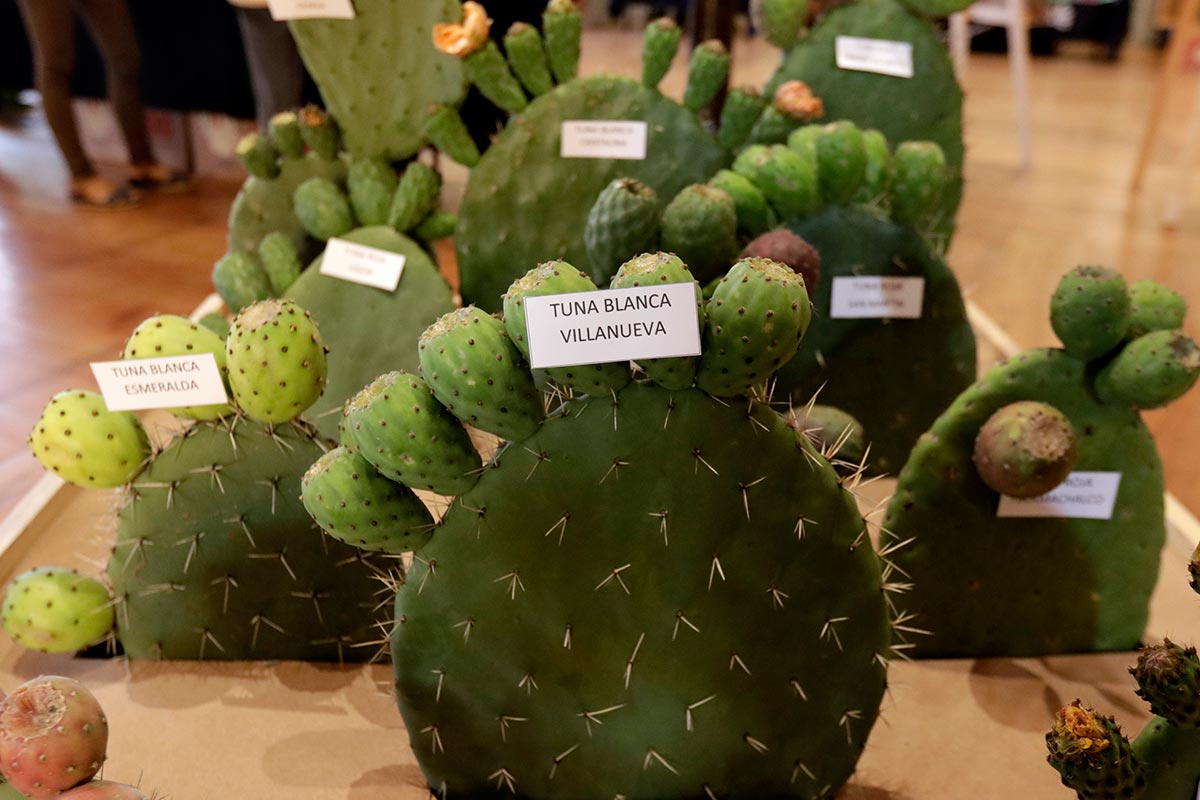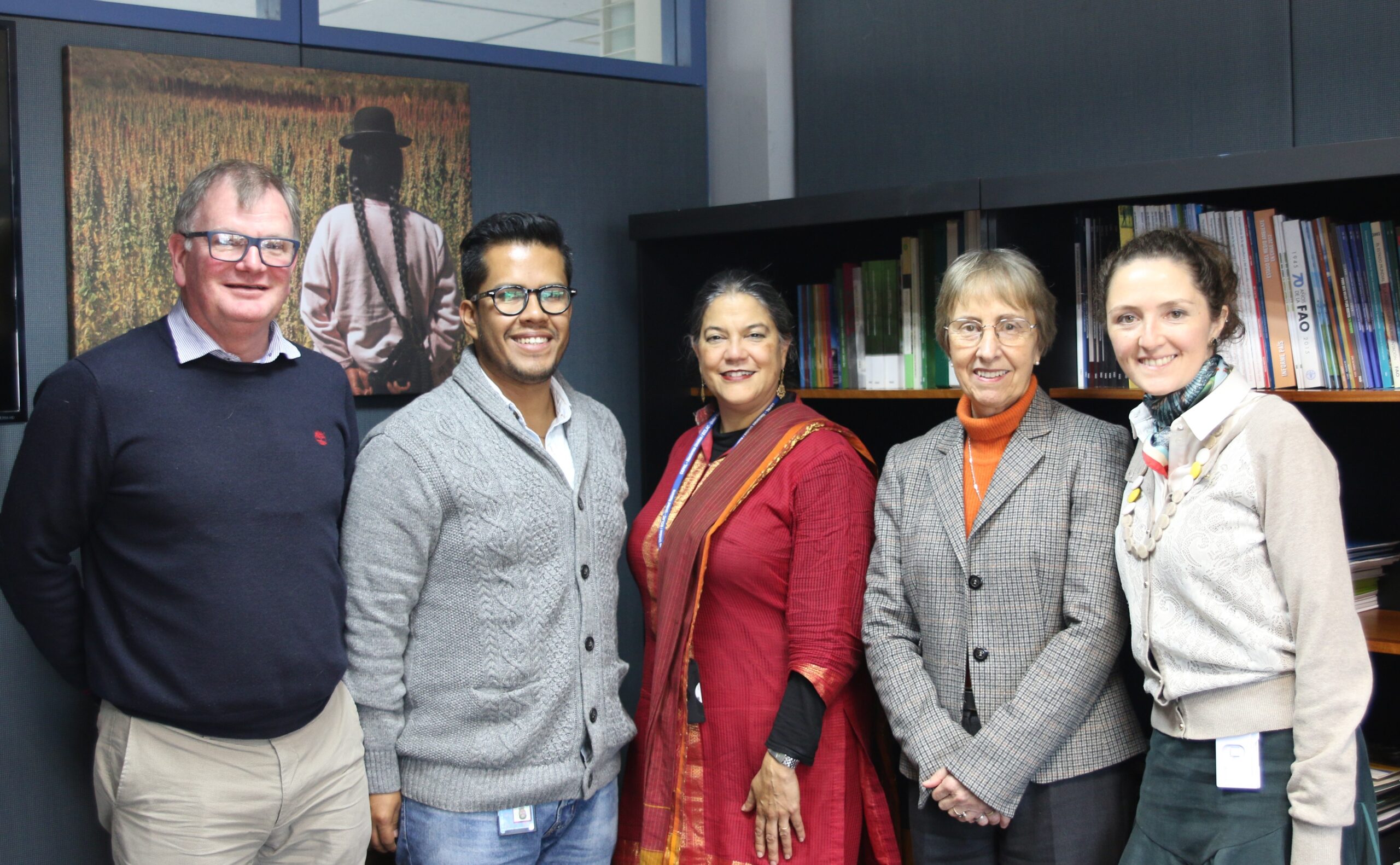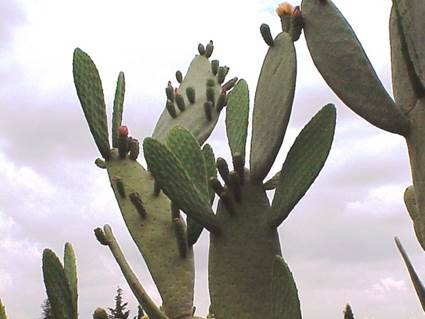Other Activities
José Graziano da Silva, Director-General of the Food and Agriculture Organization of the United Nations (FAO) visited the Faculty of Agricultural Sciences of University of Chile
José Graziano da Silva, Director-General of the Food and Agriculture Organization of the United Nations (FAO), visited the Campus Antumapu, where are located some of the Faculties related with foods from the University of Chile. Dr. Graziano da Silva had an interesting and dynamic meeting with the academics. Accompanied by the Regional Representative for FAO in Latin America and the Caribbean, Julio Berdegué, and the representative of FAO in Chile, Eve Crowley, the Director-General met with the Deans Roberto Neira (Faculty of Agricultural Sciences), Mario Maino (Faculty of Veterinary and Animal Sciences), Carmen Luz de la Maza (Faculty of Forest Sciences and Nature Conservation). Professor Carmen Sáenz, academic of the Faculty of Agricultural Sciences, and General Coordinator of FAO-ICARDA CactusNet had the opportunity to share with Dr. Graziano. Dr. Graziano da Silva presented the main issues addressed by FAO, the most important concerns of the international organization and the priority policies promoted at the world level. He also dialogue with the academics, as well as to respond to the concerns about different subjects.Food and obesity: The great problem, said Graziano, is not the production, but the distribution of foods, the access to it.
“There has been talk about the food chain, from production to consumption, but we have forgotten an important part of the agri-food system, which is what is on top of everything, which is the superstructure that conditions food systems. I refer to the institutions, the laws and all that set of elements that condition the processes “.
Example of this, explained the Director of the FAO, has been the great difficulties in the implementation of simple initiatives, such as the law of labeling or the regulation of advertising in foods harmful to health. In this line, the specialist emphasized “the problem of a good diet or obesity is not a family problem, individual, but above all a public problem”. In this framework, José Graziano, emphasized that “…science was the basis of the progress of humanity and the academy must resume that role.”
Work to be done in the desert areas: The Director of FAO reported that the Sahel is the priority of the institution. “In this area, we define whether we win or lose the fight against hunger.” The area called Sahel (Arabic word for “edge or coast”) is a geographical and climatic region of the African continent that borders the Sahara desert to the north, the savannas and forests of the Gulf of Guinea and Central Africa to the south, to the west with the Atlantic Ocean and to the east with the White Nile. It has an approximate area of 4,000,000 km² inhabited by millions of people who suffer the consequences of food shortages. Southern Mauritania, Senegal, Mali, Burkina Faso, Niger, northern Nigeria and Cameroon, as well as Chad, Sudan and Eritrea make up the Sahel belt, known as “the hunger belt”. In this regard FAO is carrying out various initiatives and Graziano highlighted the importance of recovering traditional knowledge and adapting it to innovations and new technologies.
For more information visit:
http://www.uchile.cl/noticias/150765/fao-y-u-de-chile-firmaron-convenio-de-colaboracion
http://www.agronomia.uchile.cl/noticias/150781/director-general-de-la-fao-visita-facultad-de-ciencias-agronomicas

Mexico celebrates National Nopal Day
Mexicans growers organization is pretty active, they recently held two events, one of them fully commercial and the other mostly political. From now on there will be a Dia del Nopal in Mexico. For more details please see
https://www.excelsior.com.mx/nacional/hoy-se-celebra-el-dia-nacional-del-nopal/1265985

Meeting at the FAO Regional Office in Santiago (Chile)
Prof. Carmen Sáenz, General Coordinator of FAO-ICARDA International Technical Cooperation Network on Cactus (CactusNet), held a meeting at the FAO Regional Office in Santiago (Chile), with Ms. Eve Crowley, FAO Deputy Regional Representative for Latin America and the Caribbean and FAO Representative in Chile. The purpose of this meeting was to discuss the activities carried out by CactusNet at the international level and to analyse possible joint actions around the activities developed by CactusNet at local and Latin American level. In the meeting, invited by Ms. Crowley, also participated Mr. David Nowell, Agricultural Officer, FAO Regional Office for Latin America and the Caribbean, Ms. Sara Granados, FAO Consultant in Food Systems and Mr. Byron Jara, FAO Consultant Regional Technical Project Coordinator.”

Mr. David Nowell, Agricultural Officer, FAO Regional Office for Latin America and the Caribbean, Mr. Byron Jara, FAO Consultant Regional Technical Project Coordinator, Mrs. Eve Crowley, FAO Deputy Regional Representative for Latin America and the Caribbean and FAO Representative in Chile, Prof. Carmen Sáenz, General Coordinator of FAO-ICARDA CactusNet, Ms. Sara Granados, FAO Consultant in Food Systems.
Cactus crop
- Introduction of cactus pear clones for forage to India.
- Introduction of cactus pear clones for forage and nopalitos to Argentina.
- Introduction of cactus pear fruit varieties to Iran (FAO-ICARDA TCP / IRA / 4557 Tropical Fruits).
- Improvement of cactus pear cultivation – FAO-ICARDA TCP / ARG / 8821 Frutales de zonas áridas.
- Introduction of cactus clones for forage and fruits production to Syria, Mauritania, Jordan, Pakistan.
- Introduction of cactus clones for the creation of a germplasm collection to Oman.
- ERITREA Technology transfer of cactus pear production and utilization FAO-ICARDA TCP / ERI / 8923-TCP / ERI / 2802.
- ETHIOPIA Technology transfer of cactus pear production and utilization FAO-ICARDA TCP / ETH / 2901.
- Telefood projects in Argentina, Cuba, Ethiopia.


